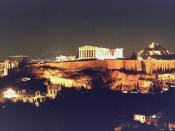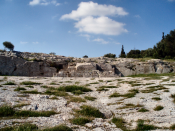The Athenian radical democracy provided freedom, although not complete freedom. The Democracy in Athens, much like the democracy currently here in the United States, was pretty broad, but there is a line in the sand where free speech and action are no longer tolerated by the state and its citizens. Direct involvement in the government was limited by the economic and social barriers of entry, so that only the rich and popular could fully participate. The poor, outcasts of society, and women were mainly barred from the political process. The Athenian radical democracy was revolutionary in the amount of freedom it gave, no other civilization before had treaded on the ideas the Athenians put forth.
Freedom is a person's ability to participate equally in society as well as be free of any restraints on their speech or actions, so long as they don't interfere with the livelihood of others.
The Athenian society made strides in providing freedom, but did not completely follow through with all the characteristics of a true democracy. The citizens of Athens did not have religious freedom, they were forced to worship the Greek gods; just as all the peoples the Greeks conquered were forced. Free speech was only free if the populous tolerated it, if what you said was offensive to the masses you would be persecuted.
The radical Democracy came about mainly because of the work of Pericles, who popularized the policy of expanding the democracy to more people than had been able to participate prior to his reign. In a funeral address for all the citizens of Athens who had died fighting Sparta Pericles spoke on the benefits of the radical democracy, "Our constitution, is called a democracy because power is in the hands not of a minority but of the whole people.


